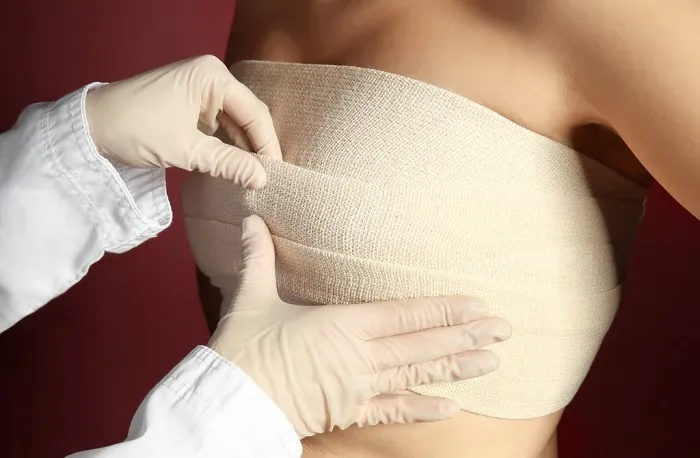A woman in China has been left severely disabled after spending nearly 2.4 million yuan (approximately $332,000 USD) on a breast augmentation procedure that turned out to contain animal DNA — including that of cows and moose — instead of the promised “self-derived” collagen. The shocking case has ignited widespread public outrage and raised serious concerns about medical safety and oversight in China’s cosmetic surgery industry.
A Risky Procedure Marketed as Innovative Technology
Lingling, a woman from Jiangxi Province in southeastern China, was introduced to the so-called “innovative” breast enhancement method in 2017 by a local beauty salon owner. According to the salon and the Beijing-based Chuangmei Medical Cosmetology Clinic, the procedure involved extracting and cultivating the patient’s own collagen and injecting it into the breast area — marketed as a “self-source, self-use” technique that promised safety and no risk of rejection.
Encouraged by these claims, Lingling traveled with the salon owner to Beijing, where surgeon Bai Jin reassured her that the procedure was simple and safe.
The Start of a Six-Year Nightmare
Shortly after the operation, Lingling began experiencing intense pain and a foreign body sensation in her chest. Her condition deteriorated over time, requiring nine additional surgeries over the next six years, including implantations and corrective operations. In total, she spent 2.39 million yuan in pursuit of relief and a healthy recovery.
By 2023, Lingling’s breast implants began leaking and deforming. She described feeling “two lumps in my chest that extend all the way to my stomach.”
Desperate for help, Lingling returned to the Beijing clinic to request corrective surgery. However, the clinic demanded a medical evaluation report first. In October 2024, she traveled to a Shanghai hospital to remove the implants and have the contents analyzed.
Shocking Discovery: Animal DNA
Doctors discovered during the removal surgery that the injected material had already caused serious internal damage. Subsequent analysis found the implants contained DNA from cows and moose — not Lingling’s own collagen, as advertised.
Authoritative medical institutions classified her condition as a severe disability, bringing with it immense physical suffering and emotional trauma.
According to Mr. Fu, a beauty industry insider interviewed by Jiangxi TV, other patients who underwent similar procedures at questionable clinics have also reported animal DNA in their implants — including from camels, bats, and even gorillas. “These non-human materials may cause adverse reactions, such as immune rejection,” Fu explained.
Seeking Justice Amid Systemic Failures
Lingling has tried to seek compensation, but the path to justice has proven difficult. The beauty salon that referred her has closed, and the Beijing Chuangmei Medical Cosmetology Clinic has had its business license revoked. The clinic has a history of malpractice, with 398 medical disputes registered against it.
Worse still, the attending physician, Bai Jin, is not registered as a qualified medical practitioner under the institution’s name. On March 1, 2025, Lingling reported the incident to the Beijing Municipal Health Commission.
Despite the report, legal action is complicated because both the beauty salon and the clinic have closed, a common tactic used by unethical operators to escape accountability. The market supervision department has stated it will further investigate the clinic’s false advertising.
Public Outrage and Social Media Backlash
The case has gone viral on Chinese social media, where related hashtags have received over 37 million views. Netizens are expressing empathy for Lingling and frustration at the systemic failures that allowed such a tragedy to happen.
One comment read:
“Appearance anxiety affects the values of many women. Lingling is so unfortunate.”
Another user criticized the regulatory loopholes:
“Many unscrupulous beauty clinics close and reopen under new names, which creates a legal gray area and makes it difficult to hold people accountable.”
A third added:
“The 2 million yuan could have been used to exercise, eat healthily, and improve appearance, instead of undergoing a nearly life-threatening surgery.”
A Call for Reform in the Cosmetic Industry
Lingling’s harrowing experience has reignited discussions about cosmetic surgery safety, medical ethics, and the beauty industry’s manipulation of body image insecurities. In China, the rapidly growing aesthetic medicine market remains underregulated, leaving patients vulnerable to misinformation, unqualified doctors, and harmful procedures.
Her story stands as a stark warning and a heartbreaking example of what can happen when profit outweighs patient safety. Advocates are now calling for tighter regulations, mandatory certification, and transparent oversight of cosmetic clinics and beauty salons nationwide.
Related topics:
- Jana Kramer Regrets Breast Augmentation To Please Ex-Boyfriend
- Brynley Arnold Shares Recovery Journey After Breast Augmentation
- Bethenny Frankel Shares Breast Augmentation Details


